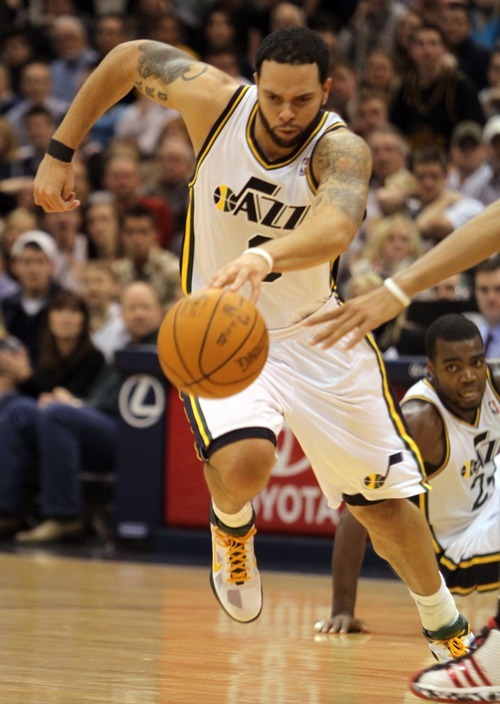This is an archived article that was published on sltrib.com in 2011, and information in the article may be outdated. It is provided only for personal research purposes and may not be reprinted.
The Jazz lead their division, they've won more than twice as many games as they've lost on the road, they've beaten some of the NBA's best teams, they are 24-11, and here's the stupid thing: They could be better than they've been.
"A lot better," says Deron Williams.
"We have a very good team," says Jerry Sloan. "I think we've barely scratched the surface of where we could be and should be."
Is that good news or bad?
"It's good news if we can figure everything out," Williams says. "It's bad news if we can't."
Williams wants to make a clear distinction between this particular iteration of the Jazz and teams he's played on in the past. He believes this Jazz team can figure it out — not just to the level of being a nice, little, competitive bunch in the Western Conference. But, rather, that the Jazz, as presently constituted, can win an NBA title.
"I wouldn't say it if I didn't believe it," he says.
His outlook might be as high and deep as the ionosphere, but his approach is ground level.
"We could be 30-5 right now," he says. "But we could also be 17-17. We've had some close games where we've had to pull out some miracles to win. We need to jump on teams and put them away early, and get some rest. We talk about that a lot. Just going out and beating people. Look at the Celtics, look at the Spurs. They do what they have to do to win. We have to do the same."
Williams' formula for crossing that threshold jibes with Sloan's.
Both agree that the Jazz need better starts, as opposed to the aforementioned sluggish beginnings that have required all sorts of late-game dramatics to save so many nights. When it is suggested that perhaps the Jazz have benefited from pacing themselves early, like a runner in a distance race setting up a win with a big finishing kick, Williams isn't buying into any upside to lurching out of the blocks.
"Oh, a quick start matters," he says. "We finish strong, but we're barely winning games and beating teams we should win and beat by more."
Monday night's tight win over Detroit at ESA is fresh on the point guard's mind. Unfortunately for him, he hasn't figured out how the Jazz can best fix the hole in their early going.
"I have no clue what the answer is," he says. "No clue."
Says Sloan: "Maybe we're still trying to find our identity a little bit. Maybe guys are trying to feel their way around, saving themselves for the end of games. But I do know that if we didn't have a good finish [against the Pistons], we lose that ballgame."
The same could be said for half the Jazz's wins. And more efficient starts might have prevented some of their losses.
Wait. There's more.
"We have to improve our execution on offense," Williams says. "We have to do a better job of running our stuff, making people guard us. In the past, we've had problems stopping guys, but we could win games by scoring points. I think it's kind of reversed now. We can clamp down on defense, we can stop anybody, and then we have trouble getting the shots we like to get."
Sloan wants better screens, better patience, better ball movement, better shots: "We haven't learned to use our offense the way we're capable of playing it."
There are other areas where Jazz upgrades are in order, foremost among them: focus and intensity on the home court, where the Jazz were once nearly unbeatable and now, they've already suffered defeat six times, once more than on the road; winning games in conference, where they are only 12-10; and rebounding, a category in which they plumb the depths of the league (27th).
Finally, the ever-driven Williams points the finger at himself, saying he needs to find a better line between scoring the ball and passing it, not just at the end of games, but from jump to buzzer.
"I'm trying to find a balance," he says. "When to take over, when to distribute. My assists numbers are down lower than where I want them to be. We're most successful when I have more assists — we're 13-2 when I have more than 10. I have to score, but I just know we're a better team when I have 12 or 13 assists."
Can all the above be straightened out and set right?
"I wouldn't say it if I didn't …"
Here, again, comes your good, better, best news.
"… believe it."
GORDON MONSON hosts "The Gordon Monson Show" weekdays from 2-6 p.m. on 1280 The Zone. He can be reached at gmonson@sltrib.com. —
Hawks at Jazz
P Wednesday, 7 p.m.
TV • FSN Utah



